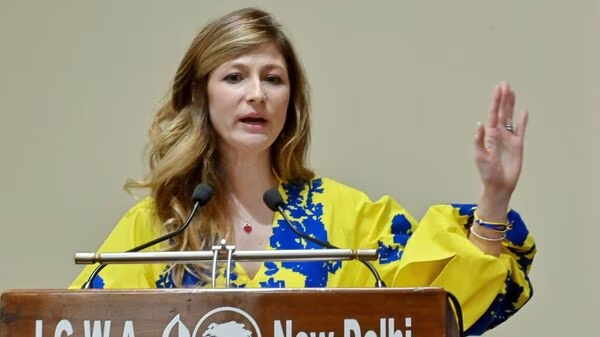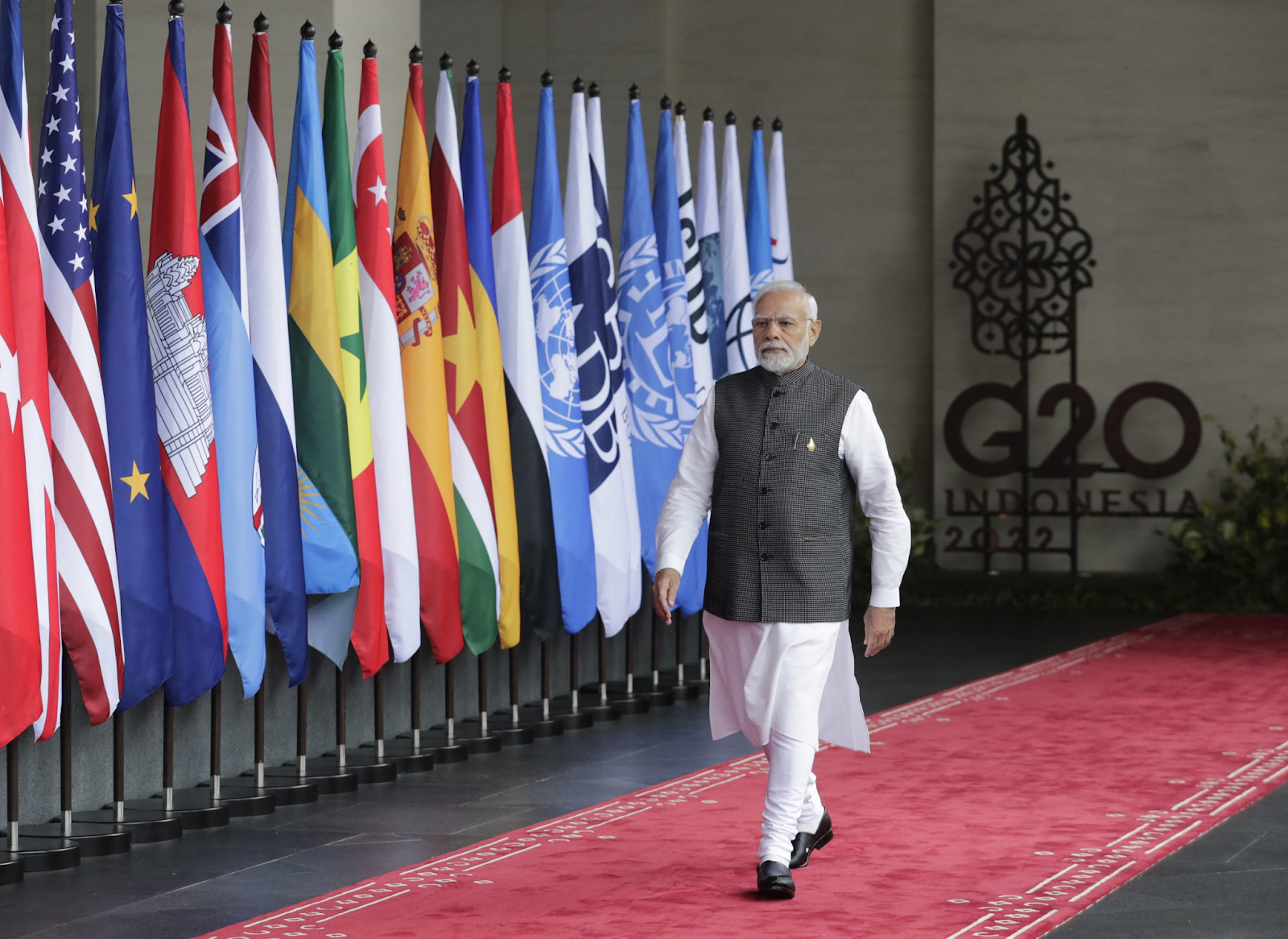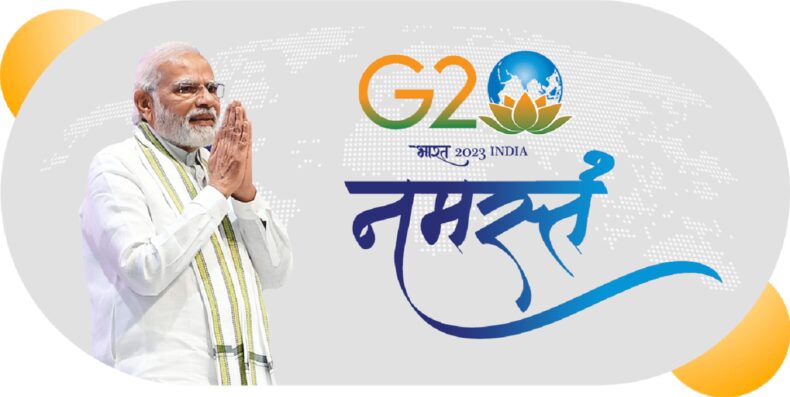It will be challenging for India to grant Ukraine’s request for a chance to address the G20 despite its desire for President Putin to attend the conference. The capacity of India to bring opposing parties to an agreement will determine the success of its presidency. Leaders’ Declaration from New Delhi

Emine Dzhaparova, the first deputy foreign minister of Ukraine, paid a visit to New Delhi this week at a time when her nation is engaged in an endlessly stalled conflict with Russia. To convince the Western alliance led by the United States to continue funding its war effort and guarantee that it avoids defeat or is not forced to accept an unfavourable territorial compromise, Ukraine feels it must alter the military facts on the ground.
Kyiv is being examined in New Delhi
Dzhaparova, the first representative of Ukraine to go to India since the start of the Russian invasion in February 2022, was in the city on a double mission. The first was a courteous invitation to New Delhi to “restart” relations with Kyiv in exchange for a more “balanced” stance on the conflict, which, according to Dzhaparova, was pro-Russian from Ukraine’s perspective. The Minister requested that National Security Advisor Ajit Doval visit Kyiv to create a “special security mechanism” between the two nations after mentioning his three trips to Moscow.
In light of the uncertainty surrounding India’s stance on the Russian invasion – despite Prime Minister Narendra Modi’s advice to President Vladimir Putin that “today’s era is not an era of war”, India has refused to condemn Moscow’s actions – comments made by the Ukrainian Foreign Minister Dmytro Kuleba in December that India was able to purchase cheap Russian oil because Ukrainians were suffering and dying did not go down well in New Delhi. Dzhaparova’s public interactions at the Manohar Parrikar Institute for Defence Studies and Analyses (IDSA), the Indian Council of World Affairs (ICWA), and another think tank were favourably welcomed.
Her matter-of-fact delivery, which was devoid of hectoring, whining, or pleading, did not raise any eyebrows. The journalist-turned-politician impressed the media with his assured message in what the Ukrainians saw as a pro-Russian setting.
Dzhaparova was given adequate “air space” in New Delhi to express her viewpoint, although the procedure was carefully followed at the formal greeting. She visited with Minister of State Meenakshi Lekhi and gave her a letter from President Volodymyr Zelenskyy addressed to Prime Minister Modi.
The president of Ukraine requests a phone call with Modi. They had already had two phone conversations, the first taking place a few days after the Russian invasion and the second in December 2022. No further high-level engagements have come from the Indian side.
“Delhi’s greeting was quite acceptable; nothing over the top. According to Rajiv Bhatia, a Senior Fellow at the foreign policy think tank Gateway House and a former Indian ambassador, allowing Dzhaparova the room for public interactions may have eased Delhi of some of the pressure to do more.
The G20 obstacle in New Delhi

The G20’s conversations concerning the global economy, according to Dzhaparova, “cannot be possible without the discussion about the repercussions of the war of Russia against Ukraine.” This is true, but it’s another thing entirely if India would take her advice seriously to “take leadership” in including Ukraine on the “agenda” of G20 summits and talks.
Making a case for Zelenskyy to speak at the G20 meeting was Dzhaparova’s second task. The pressure on India to extend an invitation to the president of Ukraine is considerable, and it doesn’t simply come from Ukraine.
How successfully India can bring the opposing parties in Russia’s conflict with Ukraine together to generate a consensus declaration that can be endorsed as the New Delhi Leaders’ Declaration will determine how successful India’s G20 presidency is.
The endeavour is made even more challenging by the fact that China, an ally of Russia, is hostile to both India and the US. Recently, Beijing and New Delhi engaged in verbal combat over Beijing’s “renaming” of locations in Arunachal Pradesh, which it refers to as “South Tibet.” The G20 Finance and Foreign Ministers meetings, in which each could only issue a “Chair’s summary” instead of a statement, made clear the challenges in getting everyone on the same page.
Indonesian President Joko Widodo worked tirelessly to forge a compromise declaration in Bali, but it had to include lines outlining the disagreements and acknowledge the disagreements over Russia. The potential of two different communique, one outlining the fundamental theme of the G20, on which there would be unanimity, and the other outlining the war in Ukraine, is one of the “multiple options” that officials may be working “on” for this year’s summit, according to Ambassador Bhatia.
Geopolitical turmoil

Ukraine is concerned about retaining Western assistance because, without it, it cannot take on Russia. However, if the Ukrainian army is unable to achieve victories on the battlefield, voices in the US opposed to continuing to provide Ukraine with material aid will acquire more and more traction.
With comments that Ukraine was “not a vital national interest” for the US and that the Biden administration’s “virtual ‘blank check’ funding of this conflict for ‘as long as it takes’, without any defined objectives or accountability, distracts from our country’s most pressing challenges,” far-right Florida Governor Ron DeSantis has already stirred the pot.
The transatlantic partnership is also being impacted by other factors.
After a trip to China and a lengthy meeting with President Xi Jinping, French President Emmanuel Macron said that Taiwan was not a problem for Europe and that the continent needed to exercise “strategic autonomy” and avoid being led by America into adopting its problems with China. His comments sent shockwaves through Europe. Though Macron has also been obliged to tone down his sentiments, the issue now is whether the Western alliance against Russia can bear the pressure of a long haul.
After bidding farewell to the Ukrainian, New Delhi is now preparing for a visit by another dignitary this month: the Russian Deputy Prime Minister Denis Manturov, who is also the Minister for Industry and Trade. New Delhi is treading a fine line as it waits and watches, crossing its fingers that a consensus will be reached at the G20 summit. Manturov will be present at a meeting of the India-Russia Inter-Governmental Commission on Trade, Economic, Scientific, Technological, and Cultural Cooperation, which is jointly headed by him and the minister of external affairs of India.













